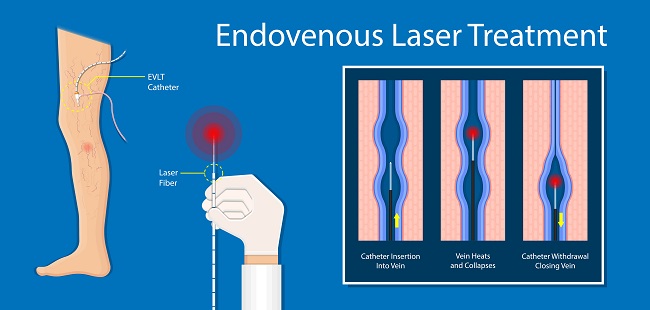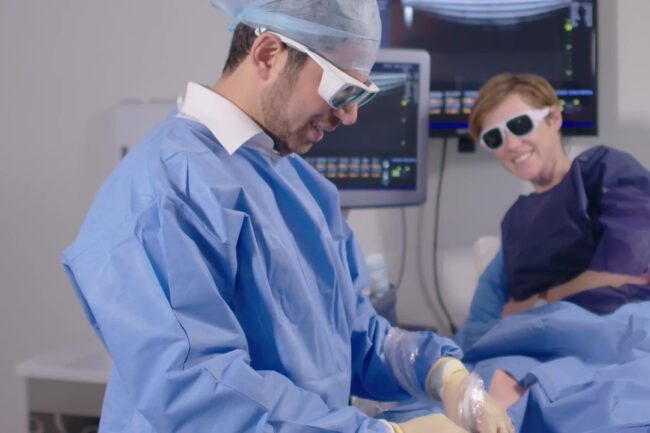There are a few varicose vein treatments available, some of which cause blood clots as a natural part of the healing process. But, some do carry a slight chance of a DVT developing.
So, to put your mind at ease, here’s a breakdown of clots and varicose vein treatment processes.
First, there’s a difference between a DVT and a regular clot.
A normal blood clot is a clot that forms in response to injury, whether that’s a nick in the skin or the result of a medical procedure. Once the healing is done, the body will naturally dissolve the clot.
A DVT, however, is a specific type of clot. It develops in the deep veins and, from there, partially blocks blood flow. A DVT can also dislodge from the vein wall. And due to it being in the deep veins that carry blood directly to the heart and lungs, this can cause a pulmonary embolism.
Some varicose vein treatments cause blood clots as part of the process.

Infographic of the EVLA varicose vein treatment process
Now, Endovenous Laser Ablation, Sclerotherapy, and Radiofrequency Ablation clot the blood to form the vein seal. For example, in EVLA, we insert a laser-tipped catheter into the vein. The laser works at a frequency ranging from 810 to 1470 (nm), the intense heat causing the blood in the vessel to clot, sealing the vein and halting blood flow. RFA is very similar, except we use radiofrequency bursts instead of a laser.
In Sclerotherapy, we use the same principle, minus the heat energy. We inject a sclerosant into the varicose vein, which agitates the vein wall and prompts blood clots before forming scar tissue. These clots are not dangerous and are part of the healing process.
Varicose Vein treatments can cause DVTs.
While some clotting is to be expected, your body may respond harshly to the procedures. This response is known as superficial phlebitis (inflammation), which presents as redness, swelling, and pain in the treatment area. If left unaddressed, superficial phlebitis may sometimes (but rarely) lead to a DVT.
Sclerotherapy poses the highest risk, followed by EVLA and RFA. We must also note that even Medical Superglue, which doesn’t rely on clotting, can cause this reaction. Granted, the risk is significantly lower.
But, modern varicose vein treatments are extremely safe.

Dr Zil Yassine performing a varicose vein treatment
Your chances of developing a DVT are very low. Each of these treatments has a <1% chance of causing one. Additionally, even in the unlikely event of superficial phlebitis, you can circumvent a DVT if you keep an eye out for the warning signs and come see us if anything’s amiss.
Make sure you follow your doctor’s pre-op and post-op advice, as this can help reduce your DVT risk even further.
Your veins are in good hands.
We at The Vein Institute are highly experienced vein specialists. All of our doctors have over 15 years of experience, and we pride ourselves on using the best treatment technology on the market.
So you don’t need to worry. If you’re ready to seek treatment, you’ll be in safe hands.
Just call us on 04 2010 2637 and book your consultation. We’ll be happy to go over any other concerns you may have.

